|
|
 |
 |
 |
 |
Happy Birthday PocketGPSWorldcom is 10 Years Old Today
Article by: Mike Barrett
Date: 1 Aug 2012
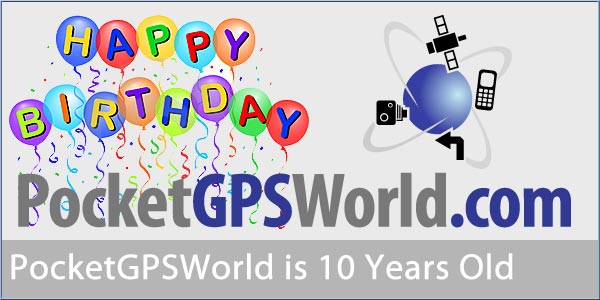
Happy Birthday PocketGPSWorld… 10 today! It was ten years ago on August 1st 2002 that the team at PocketGPSWorld.com took the wrappers off our embryonic site and opened up our muses to the world at large. Even now I remember the day well. We were waiting with great anticipation wondering how many visitors we would get, and if we had wasted our time putting all that effort into the site.
Well we were hit with a big surprise. On our first day we had over 2,500 visitors to the site exceeding our wildest dreams. At the time that was more than most business sites had in a whole year! We thought that this could not continue, but again we were very pleasantly surprised. It was not just sustainable it grew exponentially. At our peak we were getting 70,000 visitors a day viewing over 200,000 pages each day.
This article details the "Circle of Life" starting from our roots on PDAs, evolving to PNDs, and reverting to the current SmartPhone form of the original PDAs.
PocketGPSWorld started back in 2001 when 5 members of the Navman newsgroup got together to provide accurate information on how the emerging GPS systems worked. Dave Burrows, Mike Barrett, Darren Griffin, Duncan Hill and Kevin Tea were the founding members of the site and helped form it into the largest English language GPS resource in the World. The site was unveiled to the public on August 1st 2002 after we had gathered and written a number of articles on the then current GPS Products. Click here to see our original site in the way back archive.
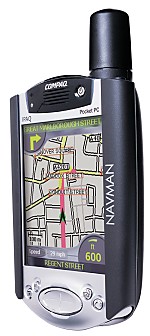 Back in 2001 when we first started GPS had been around for a little while, but it had been accurate only to 100M for consumer use. This changed in May 2000 when Bill Clinton abolished the Selective Availability and increased the accuracy of the system to 10M. This was enough to allow the use of GPS for in-car navigation systems. Mostly GPS was in use by in-car systems and handheld units from Garmin. Back in 2001 when we first started GPS had been around for a little while, but it had been accurate only to 100M for consumer use. This changed in May 2000 when Bill Clinton abolished the Selective Availability and increased the accuracy of the system to 10M. This was enough to allow the use of GPS for in-car navigation systems. Mostly GPS was in use by in-car systems and handheld units from Garmin.
PDAs changed the way GPS was used by adding GPS and maps to a mobile graphical device the paradigm shifted dramatically. I clearly remember way back in 2001 when after standing with my iPaq and Navman 3000 GPS accessory sleeve for 10 minutes all of a sudden an arrow appeared on my Memory-Map topo map showing me exactly where I was standing. Back in those days the technology was astounding though expensive. It has come a long way since then to a point where SatNav is a fully adopted consumer product. Today you can buy an all singing all dancing connected SatNav with live traffic and online services for about £250 compared to my first iPaq PDA and GPS sleeve which cost me £999.99 as a special offer from Dixons.
Back in those days the Navman came bundled with software but due to the nature of the software and the cost of storage you could not navigate from A-B. What you did was have 2 applications or map sets. One was called SmartPath Trips, the other SmartPath Cities. SmartPath Trips enabled you to navigate along the major road network towards your destination, whilst SmartPath Cities provided detailed mapping for your destination. As you can see this was a million miles away from todays navigation experience. Indeed it was almost impossible to make an impromptu trip, you had to plan in advance. You could load maps onto the PDA, but it had to be synchronised via a computer onto your memory card. Memory cards were both expensive and small in those days 64Mb being a large card.
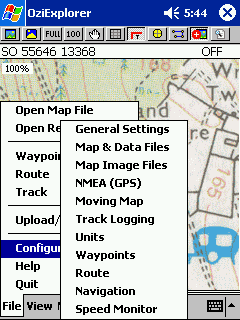 You could also add different software onto your PDA and I had a fondness for the outdoor life in those days so being able to have Ordnance Survey maps of the Brecon Beacons and the Lake District was amazing. Being up in the hills and switching the GPS on to see where I was was a stunning experience. I could also plot routes and record my tracks. I used 2 applications at the time Memory-Map and OziExplorer. Memory map provided both the application and the maps, whereas OziExplorer provided the application and the maps needed to be sourced and calibrated from other sources. Great fun… You could also add different software onto your PDA and I had a fondness for the outdoor life in those days so being able to have Ordnance Survey maps of the Brecon Beacons and the Lake District was amazing. Being up in the hills and switching the GPS on to see where I was was a stunning experience. I could also plot routes and record my tracks. I used 2 applications at the time Memory-Map and OziExplorer. Memory map provided both the application and the maps, whereas OziExplorer provided the application and the maps needed to be sourced and calibrated from other sources. Great fun…
However things were not all bright and rosy back then. The GPS was not the most reliable of electronics. The signals from the GPS Satellites are very weak and it did not take much to interrupt them and cause a loss of fix. Even walking under trees was enough to either give you a wrong location or lose the fix altogether. If you were out driving the last thing you wanted to do was stop under a bridge. If the GPS fix was lost it often took 10-15 minutes with an open view of the sky to recover it. Not something practical when you are driving, or in the woods. This was combined with poor battery life which made the PDA system
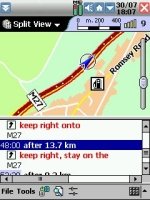 Things moved very quickly after this with the company that produced the SmartPath City and SmartPath Trips producing their own product to the market. This was a full GPS system with navigation software, all you needed was to add a PDA. This product was called TomTom Navigator. TomTom Navigator built on the experiences of the SmartPath applications plus their own products that ran on Palm systems. The TomTom Navigator was the first PDA application to provide true point to point navigation with voice commands. This of course was the springboard from which TomTom became market leaders in the GPS industry. Things moved very quickly after this with the company that produced the SmartPath City and SmartPath Trips producing their own product to the market. This was a full GPS system with navigation software, all you needed was to add a PDA. This product was called TomTom Navigator. TomTom Navigator built on the experiences of the SmartPath applications plus their own products that ran on Palm systems. The TomTom Navigator was the first PDA application to provide true point to point navigation with voice commands. This of course was the springboard from which TomTom became market leaders in the GPS industry.
One of the big features (for PocketGPSWorld) or TomTom Navigator was the introduction of POIs and the inclusion of user generated POI datasets. This was the impetus for us to start collecting and maintaining our POI databases and of course the Speed Camera Database.
Shortly after TomTom Navigator the first Bluetooth GPS was introduced by Emtac retailing at £299.99. This was a great little device for a number of reasons: firstly it increased the sensitivity of the GPS signal reception giving better fixes; and secondly it was an autonomous unit with its own power source preserving the battery life of the PDA. The Emtac lasted up to 8 hours on a single battery charge. This heralded the introduction of a whole range of BT GPS solutions.
 The next big step took place at CeBIT in March 2004 when TomTom announced the TomTom GO. Although there were a number of navigation systems on the market from Garmin and Navman at the time they were more expensive and not so user friendly. TomTom broke the mould with a trendy, easy to use Personal Navigation Device at a price point of £499 half of the competitors products. The next big step took place at CeBIT in March 2004 when TomTom announced the TomTom GO. Although there were a number of navigation systems on the market from Garmin and Navman at the time they were more expensive and not so user friendly. TomTom broke the mould with a trendy, easy to use Personal Navigation Device at a price point of £499 half of the competitors products.
The TomTom GO really took the market by storm and was the launch point for the PND into the mass market. And boy did it take off… Although the price of the TomTom GO was still relatively high it really was a groundbreaking device and TomTom couldn't make them quickly enough. At this point all the other manufacturers were on notice to play catch-up. Most were caught napping and even Garmin took a long time to realise the danger of the TomTom revolution and it took them until 2006 with the release of the Nuvi 350 before they were on level footing. Though they did come up with the Garmin i3 in 2005 an innovative but small GPS system.
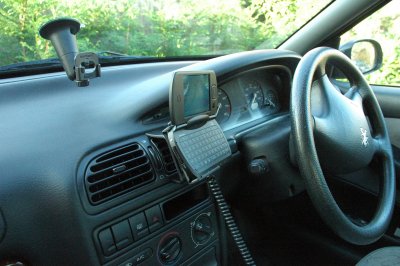
In the mean time the Taiwanese manufacturer HTC were producing the first SmartPhones which were marketed in the UK by O2 under their XDA brand. These had access to the internet via a built in SIM card and also offered voice calls as well. As these ran the same Microsoft Windows Mobile software they were ideal for SatNav applications. Interestingly these seemed to get bigger and incorporate keyboards in models like the XDA Exec which had a VGA 640x480 screen.
The next breakthrough came in 2008 when, once again, TomTom raised the bar by introducing live services. This was achieved by combining the traditional PND, which by now had become a very mature mass market product, and a mobile phone SIM card. In a deal with Vodaphone TomTom were able to put millions of connected devices collecting data out onto the roads. These feed back information to traffic servers which combine with other sources to make a very accurate view of traffic issues and patterns across the world.
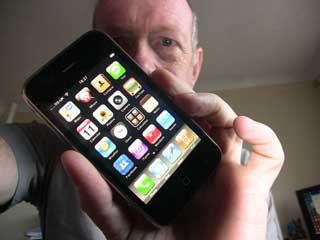
At about the same time Apple announced an update to the original iPhone. The iPhone, though stylish and functional, was crippled by not having GPS and being able to run non-Apple applications. This changed in a big way in July 2008 when the iPhone 3G was released. This had not only GPS, but the ability to run 3rd party applications from a new Apple eco-system called the AppStore. The original Apple iPhone was a huge hit, but the new iPhone 3G generated a frenzy, at its launch one of the presentations was by Peter-Frans Pauwels showing TomTom Navigator running on the new iPhone.
This changed the world again! The PND market was pretty saturated at this time, margins for retailers were so small that there was little profit to be made. The introduction of mass-market smartphones shook the foundations of the SatNav community. The navigation applications became split from the hardware once again. This allowed companies to concentrate on a single aspect of development rather than having to manage both software and hardware.
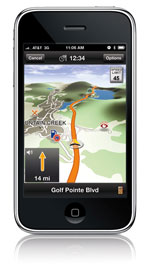 Navigon who had been struggling in the UK and US markets with their PNDs suddenly got a new lease of life when they released a software only navigation product. This very quickly took on TomTom vying for domination in the AppStore. More recently Garmin have come into the SmartPhone market with a good port of their PND software. This is combined with a number of the smaller SatNav companies moving from the PND market into SmartPhones where the cost of development and deployment are vastly reduced. Navigon who had been struggling in the UK and US markets with their PNDs suddenly got a new lease of life when they released a software only navigation product. This very quickly took on TomTom vying for domination in the AppStore. More recently Garmin have come into the SmartPhone market with a good port of their PND software. This is combined with a number of the smaller SatNav companies moving from the PND market into SmartPhones where the cost of development and deployment are vastly reduced.
Meanwhile the Android consortium was gradually gaining momentum, but it was a long slow process. There was little focus and the consortium seemed to be pulling in different directions in a hotch-potch manner. This changed in 2010 by two events firstly Google put a lot of effort into the OS and it lost its maverick image and became synonymous with the Google brand. The second was by Microsoft announcing it's own demise at MWC in Barcelona when it declared that Windows Mobile was obsolete, it would be replaced by Windows Phone 7 but that WP7 would not be available until December at the earliest and new hardware was required to run it on.
Since 2009 the PND market has been in decline, prices have dropped, but even rock bottom prices have not been able to restore the market to its former glory. The future now in navigation seems to be in the top end systems for Road Warriors and either entry level PNDs or SmartPhones for the rest of the users.
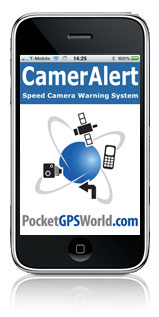 February 2010 was a landmark for PocketGPSWorld.com with the release of our CamerAlert iPhone Application. It was an instant success and stole the crown of TomTom, topping the paid app top 100 for several weeks. Since that time it has gone from strength to strength and we have entered the Android Market or should I now say Google Play… February 2010 was a landmark for PocketGPSWorld.com with the release of our CamerAlert iPhone Application. It was an instant success and stole the crown of TomTom, topping the paid app top 100 for several weeks. Since that time it has gone from strength to strength and we have entered the Android Market or should I now say Google Play…
So from our humble beginnings back in 2000 we have seen the rise of the PDA, the rise and fall of the PND, and now we have come full circle to the modern day PDA in the form of the SmartPhone. In all that time we have seen two constants in the navigation Market: TomTom and Garmin. I appreciate that I have compressed an entire decade into a few short paragraphs and omitted the topographical and marine segments of our market where brands such as Anquet, Fugawi, Maptech and Memory-Map have been constants.
My main omission, however, has been mention of our community and the people that help us manage and run it. We have just under 400,000 registered users on the site. Our thanks to all of you who have supported us in the last 10 years, and a special thanks go out to the moderators and verifiers who have contributed much of their free time to help us be one of the foremost and authoritative portals for GPS information.
Below is a picture of some of the PocketGPSWorld.com staff and moderators taken way back in 2006...
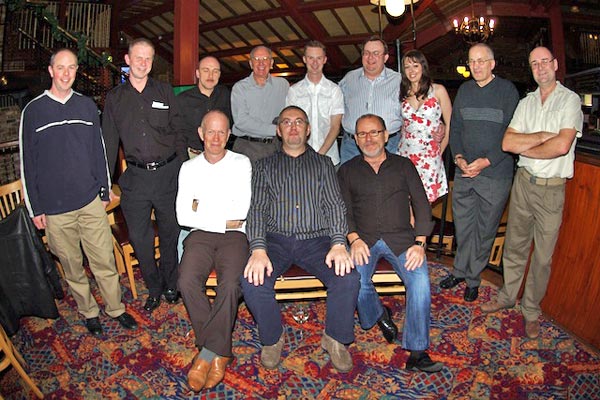
| | |  |
| Comments
|
 Posted by Anita on Tue Jul 31, 2012 11:35 pm Posted by Anita on Tue Jul 31, 2012 11:35 pm |
 |

and may there be many more to come!
Anita
TomTom VIA 135 - App 12.075
UK map 1130.12368
Samsung Galaxy S21 |
|
 Posted by AliOnHols on Wed Aug 01, 2012 6:26 am Posted by AliOnHols on Wed Aug 01, 2012 6:26 am |
 |
Happy Birthday PocketGPSWorld.
Great write up giving the background to the site and GPS.
Here's to the next ten years, Cheers.
Garmin Nuvi 2599
Android with CamerAlert, OsmAnd+, Waze & TT Europe.
TomTom GO 730, GO 930, GO 940 & Rider2.
SatMap Active 10 & 20. |
|
 Posted by spook51 on Wed Aug 01, 2012 6:34 am Posted by spook51 on Wed Aug 01, 2012 6:34 am |
 |
Congratulations on your 10th birthday and thanks for all the help you've given.

|
|
 Posted by alix776 on Wed Aug 01, 2012 8:10 am Posted by alix776 on Wed Aug 01, 2012 8:10 am |
 |
Happy birthday I can't believe it's been so long
currently using aponia truck navigation on windows phone. Good bye IOS don't let the door hit you on the way out .
Oh the joys of being a courier.
device Lumia 950 xl |
|
 Posted by bedbug on Wed Aug 01, 2012 9:43 am Posted by bedbug on Wed Aug 01, 2012 9:43 am |
 |
Happy Birthday you guys! Thanks for 10 years of sterling service, and here's to the next 10! 
iPhone 4/4S (iOS 5.1.1); TomTom Western Europe (1.10)/USA & Canada (1.10); CoPilot for iPhone (8), UK mapping, Mac OS 10.8/XP Pro/Win7; Tongue firmly in cheek! |
|
 Posted by MaFt on Wed Aug 01, 2012 10:29 am Posted by MaFt on Wed Aug 01, 2012 10:29 am |
 |
My word, that means I've been working with you lot for nearly 6 years!!
Maft
|
|
 Posted by bmuskett on Wed Aug 01, 2012 2:43 pm Posted by bmuskett on Wed Aug 01, 2012 2:43 pm |
 |
Well done, guys. Congratulations.
|
|
 Posted by dorsetwurzel on Wed Aug 01, 2012 5:08 pm Posted by dorsetwurzel on Wed Aug 01, 2012 5:08 pm |
 |
Happy birthday guys. Thanks for all the help, info and news over the years.
Who would have thought we would have access to so much useful GPS tech 10 years ago?!
Here's to the next 10.
|
|
|
| Click here to view more comments... |
|
 |
|
|
 |
 |
 |
 |
|
|